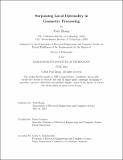Surpassing Local Optimality in Geometry Processing
Author(s)
Zhang, Paul
DownloadThesis PDF (73.99Mb)
Advisor
Solomon, Justin
Terms of use
Metadata
Show full item recordAbstract
Geometry processing is a diverse field studying questions such as how to represent a shape, how to modify a shape, and how shapes respond to perturbation. These questions lie at the heart of many applications in computational design, simulation, fabrication, and animation. We approach these problems through the lens of geometric optimization where solutions are acquired by defining application specific objective functions paired with geometry dependent constraints. These problems can generically be solved with Newton’s method to initialization dependent local optima. In this thesis, we examine whether problem specific knowledge can be leveraged to employ more advanced optimization techniques and obtain better results. We specifically explore the use of convex relaxation, variable augmentation and sum-of-squares programming to target cross-field based quad meshing, hexahedral mesh quality enhancement, and algebraic collision detection. With these tools, we manage to avoid shallower local minima and sometimes to reach or even surpass globally optimal solutions. We conclude with some principles by which these methods can be generally applied to other parts of geometry processing or optimization.
Date issued
2023-06Department
Massachusetts Institute of Technology. Department of Electrical Engineering and Computer SciencePublisher
Massachusetts Institute of Technology